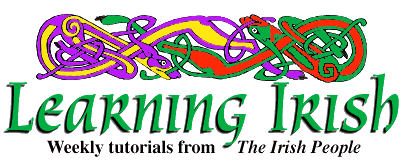
Irish Lesson 12
|
The letter pair "eo" usually represents the sound "oh". Hold it somewhat longer than if it were in an English word, and do not add the short (oo) sound in English (oh). Examples of "eo" beginning a word: eolas (OH-luhs), knowledge; eorna (OHR-nuh), barley. If a consonant comes before the "eo", the consonant gets its slender sound, and there is often an audible (y) sound, between consonant and "eo". Examples, with slender consonants you learned to pronounce in Lessons 1 and 2: ceo (kyoh), mist; deo (dyoh), end; geoin (GYOH-in), hum; teo (tyoh), warmth. Other examples: beo (byoh), living; feoil (FYOH-il), meat; meon (myohn), mind; neodrach (NYOH-druhk*), neutral. If an "s" comes before the "eo", no (y) sound is heard, only the (sh) of slender "s". Examples: seoid (SHOH-id), jewel; seomra (SHOHM-ruh), room; seó (shoh), show. Do not confuse "seó" with "seo" (shuh), meaning "this". "Seo" is an exception to the general (oh) pronunciation for "eo". "Deoch" (dyuhk*), a drink, is also an exception. The word "seomra" is another exception in parts of Ireland, where it is pronounced (SHUHM-ruh). In general, the (oh) sound in "seomra" is not held as long as in most "eo" examples. GRAMMAR To say that a person or object is not in some general class, use these forms: Ní dochtúir mé (nee dohk*-TOO-ir may*), I am not a doctor. Ní dochtúir tú (nee dohk*-TOO-ir too), You are not a doctor. Ní dochtúir é (nee dohk*-TOO-ir ay*), He is not a doctor. Ní dochtúir í (nee dohk*-TOO-ir ee), She is not a doctor. Ní dochtúir sinn (nee dohk*-TOO-ir shin), We are not doctors. Ní dochtúirí sibh (nee dohk*-TOO-ree shiv), You (plural) are not doctors. Ní dochtúirí iad (nee dohk*-TOO-ree EE-uhd), They are not doctors. The questions connected with this are: An dochtúir mé? (un dohk*-TOO-ir may*) Am I a doctor?, etc., and: Nach dochtúir mé? (nahk* dohk*-TOO-ir may*), Am I not a doctor? Etc. To answer these questions , the forms are: Is dochtúir mé, or: Is ea (sha), It is so, I am. The negative answer is: Ní hea (nee HA), It is not so, I am not. A longer answer is: Ní hea, ach múinteoir (nee HA, ahk* moo-inTYOHR), I am not, but I am a teacher. VOCABULARY Masculine nouns páiste (PAW*SH-te), child páistí (PAW*SH-tee), children Éireannaigh (AY*R-uh-nee), Irish persons Meiriceánaigh (mer-uh-KAW*-nee), Americans dlíodóir (dlee-uh-DOH-ir), lawyer dlíodóirí (dlee-uh-DOH-i-ree), lawyers feirmeoir (fer-im-OH-ir) farmer feirmeoirí (fer-im-OH-i-ree) farmers Feminine nouns banaltra, an bhanaltra (BAHN-uhl-truh, un VAHN-uhl-truh), nurse, the nurse banaltraí (BAHN-uhl-tree), nurses buatais, an bhuatais (BOO-tish, un VOO-tish), boot, the boot buataisí (BOO-ti-shee), boots garbh (GAHR-ruhv), rough dona (DUH-nuh), bad; (as weather) go leor (goh lohr), enough ar dtús (er DOOS), at first, first trom (truhm), heavy DRILL Go through "is", substituting all the nouns above except "buatais", in the following pattern: An páiste mé?, Ní hea, ach Éireannach. An páiste tú? Ní hea, ach Meiriceánach. An páiste é? Ní hea, ach dlíodóir. Etc. Continue to: An páistí iad? Ní hea, ach Meirceánaigh. Then change to: An Éireannach mé? Ní hea, ach Meirceánach. Etc. In each sentence, make sure that you use the proper number, either singular or plural. CONVERSATION Pádraigín (PAW*-dri-geen): Dia daoibh, a mham agus a dhaid (DEE-uh-geev, uh vwahm AH-guhs uh gahd). Hello mom and dad. Máirín (maw*-REEN): Dia duit, a stór (DEE-uh git, uh stohr). Conas tá tú? (KUN-uhs taw* too) Hello, dear. How are you? Pádraigín: Tá mé go maith (taw* may* goh mah). Lá garbh sa scoil inniú (law* GAHR-ruhv suh skuhl in-YOO). Céard é sin ar an mbord? (kay*rd ay* shin er un mohrd) I'm well. Rough time in school today. What's that on the table? Máirín: Is subh í, ach bain diot an cóta agus na bróga, ar dtús (is soov ee, ahk* bwin DEE-uht un KOH-tuh AH-guhs nuh BROHG-uh er DOOS). Tá do chosa fliuch (taw* duh K*UH-suh flyuk*). It's jam, but take off the coat and shoes first. Your feet are wet. Pádraigín: Tá an aimsir dona go leor (taw* un EYEM-sheer DUH-nuh goh lohr), The weather's bad enough. Dónall (DOH-nuhl): Suas an staighre leat, agus ná bí ag piocadh ar an arán (SOO-uhs un STEYE-ruh lat, AH-guhs naw* bee uh PIK-uh er un uh-RAW*N). Up the stairs with you, and don't be picking at the bread. Máirín: Cá bhfuair mé an páiste sin? (kaw* VOO-ir may* un PAW*SH-te shin) Where did I get that child? Note: In the word "aimsir", the first syllable approximately rhymes with the English word "chime" not with the phrase "buy 'em". (c) 1997 The Irish People. May be reprinted with credit. |